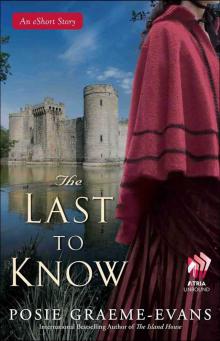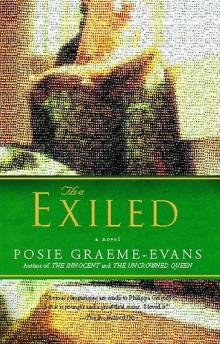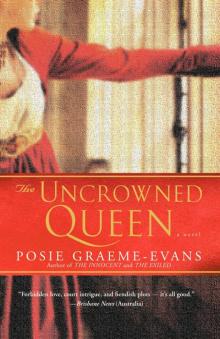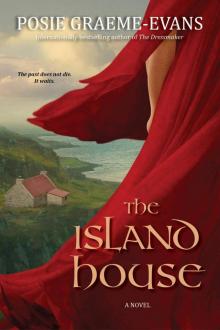- Home
- Posie Graeme-Evans
The Exiled Page 11
The Exiled Read online
Page 11
After William Caxton left, Anne paced up and down. She was furious — outraged! — but also badly frightened by the malice and stupidity of the commercial rivals she and Mathew had taken on. Hurt worked like poison. It was sad and very lonely to be the eternal outsider, and a fearful darkness beckoned when she tried to imagine what it would be like to fight her rivals.
On the other hand, she had what she and her son needed to survive now. If she gave in to the Guild, ceased to trade, it would be impossible to stay in Brugge, but she could start again. Somewhere else, she and Deborah and little Edward.
That made her shiver. There was risk to her child, either way.
The attack on the canal last winter had frightened her badly at the time, though Anne had never acknowledged it to herself, or anyone else. But, with this new threat, could she really face the certainty of living with drawn blades her entire life? Shadows lurked in her past and now her present: beckoning shadows, greedy ghosts.
Like a phantom, like a wraith, a face took form from darkness. Elisabeth Wydeville. Edward’s queen.
Was the wheel of fate turning again so that, like Anne’s own mother before her, another Queen of England wished her to die because of the king, her husband?
Or was it now safer for Edward, for his throne, if she ceased to exist? Did he know about his son?
Brugge was the hub of Northern Europe and news flowed through the Markt. Anne had often heard in the last year, how the Kingdom of England continued unsettled, and how the rivalry between Edward and Warwick grew more poisonous; and also how the king had been a faithful husband to the queen for more than a miraculous year.
But Edward sat uneasy on the throne, so they said, his tenure challenged by rumours that the former French Queen of England, Margaret of Anjou, was planning to retake the kingdom with help from the French and reinstall the fugitive Henry VI, Anne’s own father, the father she had never met, on the throne. And in this climate, Anne herself, and her son, Edward’s son — his existence so far a secret — could, if she so chose, become a potent threat to Edward’s reign.
Perhaps Warwick knew she was in Brugge? Was it he who had tried to kidnap her that night? As Henry VI’s natural daughter, Anne knew that she and her son, the son of a king, could become the nexus of a new royal house. Just a quick forced marriage to one of Warwick’s supporters — George of Clarence, for instance, the disaffected and jealous younger brother of the king himself — and it would be done. Perhaps Edward knew where she was and sought to kill her first. Perhaps that was easier: the pragmatics of politics and kingdoms winning over waning affection, dimmed by time?
Anne was queasy with the florid possibilities; these were formidable potential enemies each one of them — and her life was worth a candle flame on a windy night if she was forced into play on the chessboard of England.
Chapter Fourteen
In London, Elisabeth Wydeville, the queen, was inspecting the contents of the jewel coffers that would travel with Margaret of England as part of her marriage dower. She was there at the invitation of Margaret’s mother Cicely, Duchess of York, and she was very annoyed.
Seemingly oblivious of her daughter-in-law’s mood, Duchess Cicely was listing jewels from a long roll of finest calf-skin vellum, reading the description of each piece dispassionately, yet there was just the faintest glimmer of triumph in her tone, triumph that was causing England’s queen to dig her nails into the palms of her very soft hands.
Elisabeth attempted to think cooling thoughts — ice in winter, hoar frost in trees, snow drifting to the ground — but it was not enough; she could have screamed from irritation, though she would not give the duchess such satisfaction. As usual Edward’s foolish — blindly foolish — indulgence of his sister meant that her wishes, Elisabeth’s wishes — the wishes of the Queen of England — were being disregarded yet again.
‘Item: one collar of pearls — all pink — dependent rose-coloured diamonds. Item: gold cloak pin, head thereof worked with diamonds to the shape of a sun, fully rayed about. Item ...’
The list went on and on, many of the jewels items which Edward had promised to Elisabeth for her exclusive use from the treasury of England.
The queen simmered. Edward was weak — and blind! He had not thought of her feelings, or, if he had, he’d thought it more important to placate his mother and sister! Seeing the queen compress her soft, pretty mouth into a thin line, the duchess read even more slowly, taking care to pronounce the name and kind of each jewel lovingly and clearly.
Edward strolled into this poisonous atmosphere unwittingly and was charmed by the graceful tableau he saw. Elisabeth was dressed in fashionable scarlet and black, and was sitting in a gilded chair of state, the sun a halo for her yellow head.
The queen looked up as her women dropped into deep curtsies for the king. Edward smiled warmly, charmingly and, reaching down, helped Duchess Cicely to her feet before bowing deeply to his queen.
Elisabeth clenched her jaw violently to stop the scream.
Why even now did his eyes drop below her waist whenever he saw her! She’d been pregnant before — would looking at that small bump do anything to hasten the birth of a son? She was just an object — a pitcher to contain his precious seed. A pint pot! Not a woman — no, not that any more; not the lover he had so lusted for — was it only so few years ago?
However, a warm and loving smile greeted the king when he looked up from his bow — so warm, he was astonished. ‘Dearest husband, your noble mother has been showing me the Lady Margaret’s dower, from the treasury. But Edward, I am so worried.’
‘Worried, mine own heart?’ The king grew nervous, there was something in the queen’s voice.
The queen frowned charmingly and looked up into Edward’s face, a picture of concerned duty and innocence.
‘Yes, Edward — we shall look so shabby to the duke.’ Duchess Cicely looked up sharply, but before the king could reply, the queen swept on.
‘Shabby — yes! The Lady Margaret is the sister of a king, the king of this great country, England, and yet we think fit to send her off to Burgundy with such shoddy trinkets in her dower! You know that Duke Charles has the most exquisite taste. He will think us poor and second rate if this is all we can send for her to wear at his court. And, besides, they will all laugh at her. Every one of these jewels is so old-fashioned — so badly made, even if some of the stones are passable — that they will think our rich and prosperous kingdom is but the fief of some petty little princeling who does not know how to look after his own family!’
The Duchess Cicely saw what was happening and hurried to intervene.
‘Ah, but Your Majesty is too harsh; far, far too severe. These are fine jewels, very fine, it seems to me.’
‘Not fine enough, Duchess — not for our dearest sister-in-law and your daughter; you’re just putting a brave face on it,’ the queen smiled charmingly at the duchess, implacable. ‘No, Edward — your mother’s bravery must be rewarded. To have such a mother is a noble thing.’ Here the queen arose and curtsied to her mother-in-law, who, gritting her teeth, had to curtsey back more deeply.
‘No, indeed, better must be found. Perhaps we can look at the treasure of some of the nobles at court. And yes — Duchess, I would not ordinarily express an opinion, as you know — because the Lady Margaret has no diamonds of her own worth speaking of, perhaps the York crown and collar of state might suffice? They are both very fine, and we none of us would feel ashamed for her to be seen in jewels such as these?’
The duchess choked into a coughing fit and as her attendants rushed to aid her, the king saw the trap he’d been led to.
‘The York diamonds are part of the patrimony of my house, our house, Elisabeth. As a daughter of England, it is fitting my sister receive her dower from the treasure of England — not that of York.’
Graciously the queen smiled. ‘But of course, my love. I quite understand your attachment to the jewels of your own house. Still, a mother is often sentimental about her only d
aughter, as your dear mother most certainly is. It is understandable, is it not, if the duchess wishes to honour her child in this way ... after all, we have seen the Lady Margaret wear the York jewels many times; indeed, I have often thought how well they do become her. As for the crown, I thought she looked touchingly sweet in it at my coronation. Oh please, Edward, make your sister happy, for the sake of this country.’
‘The only way I’d be happy is if I didn’t have to go!’
Margaret had entered the presence chamber, unheard by all of them because of her velvet house shoes.
Now the king was really angry. He had had enough from all of them, particularly from his sister. Sharply he clapped his hands and the breathless throng of courtiers and servants reluctantly trailed out of the room, desperate to know what was being said as the pikemen closed the doors of the presence chamber behind the last of them.
‘Margaret, this is nonsense. You are going because it’s your duty to go. And, if there’s any more fuss, I’ll send you naked without one jewel to your name. The duke will like that!’
The three women heard the steel in the king’s tone as Edward stamped over to his own chair of state and dropped into it. Would none of this end? Perhaps there would be some sort of peace when his sister was finally gone from court.
Then it came to him — the solution. He’d have some fun and do some good at the same time — he’d always liked Brugge!
‘Very well, I have decided. To stop this nonsense from continuing, I shall take Margaret to her marriage. You will not disobey me when I hand you to your husband personally, sister.’
The queen gasped, so did the duchess; his sister burst into tears.
‘And before you all berate me with it — yes, I’ve changed my mind. This alliance is too important to be left to chance. I’m going, I shall personally give Margaret away and you, my dear wife, will remain in London as my regent — we must not risk the health of this child. And you, mother most dear, should return to York. Frail health is to be expected in one of your advanced years.’
That made the duchess really, really angry — she was barely forty-five.
‘For you are too precious to our kingdom for me to selfishly send you as my lone emissary on a long and dangerous sea voyage to Flanders. There. My final word.’
And he got himself out of the room with great dispatch, and as much dignity as he could muster, before any of the troublesome women in his life could gather themselves to reply.
There was a seething silence in his wake. Stiffly, after a moment, the duchess got to her feet and made a rigid curtsey to the queen, her daughter-in-law. Then, back straight, she left the chamber without even one more word, as did the Lady Margaret, gulping hard to swallow tears.
Elisabeth Wydeville watched them leave, white-faced. She had rarely felt such anger or indeed, such fear.
‘Lacey! Lacey — I need you!’
The queen’s chief body servant, a colourless woman who was heartily frightened of her mistress, slipped through the opened door and scuttled to the queen, bowing nervously. Elisabeth rarely raised her voice, but this was one of those times, the times they all dreaded.
‘I want parchment and ink. And a quill. Now!’
Panicked by the queen’s freezing eyes, her suddenly harsh voice, the woman bobbed a curtsey and rushed to obey.
‘And a messenger! I want a king’s man ready to ride for Dover as soon as I have done. You will bring him to me here and you will tell no one. No one at all.’
Foolishly the woman dared to ask a question — she was only trying to be helpful.
‘But must not the man tell the Sergeant of the Watch?’
‘No!’ The concentrated venom in the queen’s glance made poor Lacey gasp with fear and she fled the room as quickly as thought.
Elisabeth Wydeville, Queen of England, twisted the seal ring on her left hand as the savage red rage ebbed only slightly. Fear took its place, lapping high in her chest.
This was a message she alone would write, she alone would send. It would be a cog in the great mechanism that turned the wheel of fate; she had set that engine running some little time ago. It was a powerful image, the wheel of destiny. The queen closed her eyes. Against all the odds, she had successfully ridden high and higher on the rim; surely she was rising on it still?
She relaxed. Even smiled. Destiny was her friend because she had the courage to shape her own fate. And that of others.
She’d done it before, and now, she’d do it again.
Chapter Fifteen
Spring is a chancy season, and a week or so after Anne’s meeting with William Caxton, there was a cold dawn; a winter’s edge to the wind had the draughts chasing themselves through Mathew Cuttifer’s hall, fluttering the hangings.
Anne slept late and Deborah made sure that none of the household disturbed her. Ivan had been banished to the stables and Edward taken downstairs whilst still asleep, to find himself waking in the kitchen — hungry already as a fine piece of bacon broiled for his breakfast.
So it was very quiet as Anne began to wake, and for one eerie moment she did not recognise her room, did not know where she was.
And in that half-dreaming world it seemed she heard someone, something calling her name. Something so big, so dark, so frightening that she jerked awake and forced her eyes open. As if to stay asleep would cost her life, and more.
Heart hammering, she sat up and before rational thought, ran over to the window seat and flung up the lid. There, inside, folded neatly under a pile of fresh linen shifts was a faded but serviceable cloak. Impulsively Anne burrowed out the old worsted garment and buried her face in it, sudden tears blurring her vision as she inhaled the scent of lavender and wormwood in the folds.
‘Anne?’ Quick steps behind her and now Deborah was there, cradling and soothing.
‘Now, weeting, what’s this, what’s this? It’s not so bad, not so bad now.’
But it was, there was terror and it was coming for her — Anne was very sure of that, waking or dreaming.
Sometimes when life seemed impossible, as the bad dreams sometimes made her feel, Anne sought solace in the one thing left behind that her mother had worn. The cloak.
Alyce de Bohun, her mother, had been wearing it the night that Anne was born, the same night she had died. Deborah had kept during Anne’s childhood at her cottage in the forest and though it had been carefully washed, it was still faintly stained from the birth blood, her mother’s life blood. In exile, Deborah had given it back to her foster-daughter — only the two of them knew of its existence.
If only she could wrap herself in its folds and become invisible, or, as some witches were said to do, put it on and fly away. Fly away to some foreign land where she was not known and could begin again, in safety and peace.
‘Since you’ve missed mass today, child, would you like me to bring you food?’
Deborah was frightened by Anne’s wild sadness. Instinctively she tried to wind the rituals of a normal day around her foster-daughter. Doing what you knew, what was expected, helped sometimes.
But Anne covered her face with her two hands and for a moment, did not speak. Then, as calmly as she could, ’I should like water first to rinse my mouth, please, Deborah, and then I will need to dress for the day. We have much to accomplish this morning.’
But then it was too much, all of it, and she found herself clinging to Deborah, rocking in her arms, sobbing like a broken-hearted child.
The bells were tolling for None by the time Anne was settled in the working chamber.
‘Maxim, have we received any replies?’
Maxim shook his head; he admired Anne’s composure. To have heard her ask the question, so apparently casual, so unconcerned, was an act of courage. He knew how high the stakes had become recently between Anne and the English merchants, for Anne had decided to commission a special mass in celebration of the future marriage of the Duke of Burgundy to the Lady Margaret, sister to the King of England. It would be held in the Spee
lmanskapel — the Minstrels’ Chapel — in two days’ time, and Anne had humbly asked that her countrymen, the merchants of the Guild of the English Merchant Adventurers, join her and share in this joint celebration.
Anne nodded calmly. ‘No doubt we’ll hear by tomorrow. Pass me the ledger for cloth sales, please, Maxim.’
Quietly and resolutely, she and Maxim pursued their tasks together, each noting Meinheer Boter’s very satisfying tallies of all their commercial activity this month, which continued unabated, and comparing them with the same figures of a month ago.
Anne exercised rigid discipline to keep her mind on the task, but unconsciously, her despair clamoured for expression. For weeks and weeks she’d been building the hope that she and Edward would meet again at the wedding. Duke Charles had invited her to all the major festivities and she too had had the seamstresses working, day and night, to make her new clothes, clothes with which to dazzle not only all of Brugge, but the King of England also, the man she loved.
But if William Caxton’s warning was true, if she were to be murdered ...
‘It’s not true, you know.’
She was jolted out of introspection by a warm laugh and turned to find the friar, Father Giorgio, laughing at her from the doorway of the parlour. ‘Whatever you are thinking, it’s not so bad as you think. It may never happen. In my experience God is good. Most things we care about, really care about, turn out well.’
Anne did not comment as she carefully finished the last of the notes she was making in the margin of a ledger.
‘There, Maxim — this is the last. Please return them all to Meinheer Boter, if you please.’
Quickly and efficiently Maxim gathered up the great, wooden-bound books and, bowing respectfully to the friar — whom he did not particularly like; he was far too polished for a priest — hurried out. He’d have a word to Deborah shortly, though. He didn’t like to see Anne so down, so worried, even if she thought she was hiding her low spirits from them all.

 The Last to Know
The Last to Know The Exiled
The Exiled The Uncrowned Queen
The Uncrowned Queen The Island House
The Island House Wild Wood
Wild Wood